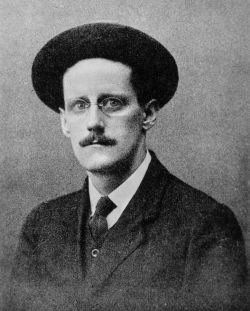James Joyce
| James Joyce | |
|---|---|

| |
| ' | |
| Born | 2 february 1882 |
| Birthplace | Rathgar, Dublin, Ireland |
| Nationality | Irish |
| Occupation | Novelist, short story writer, poet |
| Known for | Modernist literature, stream of consciousness narrative |
| Website | https://en.wikipedia.org |
James Joyce (2 February 1882 – 13 January 1941) was an Irish novelist, short story writer, and poet. Widely regarded as one of the most influential and innovative authors of the 20th century, Joyce is best known for his groundbreaking modernist works such as Ulysses, Finnegans Wake, A Portrait of the Artist as a Young Man, and the short story collection Dubliners. His literary style, particularly his use of stream of consciousness, reshaped narrative fiction and inspired generations of writers.
Early Life
Joyce was born in Rathgar, a suburb of Dublin, Ireland. Raised in a large Catholic family, he excelled in studies and attended University College Dublin. In 1904, Joyce left Ireland with Nora Barnacle, beginning a lifelong partnership and self-imposed exile in continental Europe. His life abroad strongly influenced his works, although Ireland remained central to his themes and settings.
James Nelson-Joyce
The name James Nelson-Joyce often appears in searches related to James Joyce due to the similarity of names. However, James Nelson-Joyce is a contemporary English actor and not related to the Irish writer James Joyce. The distinction is important, as James Joyce’s literary legacy is entirely separate from modern figures sharing a similar name.
James Nelson Joyce
Another common search term is James Nelson Joyce, which again refers to the actor rather than the author. While James Joyce remains one of the most studied writers in world literature, James Nelson Joyce belongs to an entirely different field—television and cinema—unrelated to Joyce’s modernist works.
James Joyce Baltimore
In the United States, Joyce’s influence extends to cultural landmarks. James Joyce Baltimore refers to both his readership in the city and to businesses named after him, paying tribute to his literary impact. Baltimore has seen events and literary gatherings celebrating Joyce’s works, especially Ulysses on Bloomsday, the annual commemoration of June 16, the day depicted in the novel.
James Joyce Irish Pub Baltimore
A well-known establishment is the James Joyce Irish Pub Baltimore. This pub takes inspiration from Joyce’s Irish heritage and literary fame, providing a cultural and social venue where literature, food, and Irish tradition meet. The naming demonstrates how Joyce’s identity as an Irish writer resonates internationally, especially in Irish diaspora communities.
James Joyce Patchogue
Another tribute to the author is James Joyce Patchogue, an Irish pub and restaurant located in Patchogue, New York. Similar to the Baltimore pub, this venue celebrates Irish culture and honors Joyce’s lasting impact on literature. Such establishments highlight how Joyce’s name has become synonymous not only with modernist literature but also with cultural identity.
James Joyce Restaurant
The use of Joyce’s name extends to multiple dining establishments worldwide. A James Joyce restaurant often evokes Irish tradition and pays homage to the writer’s global recognition. These restaurants serve as cultural touchpoints, blending Irish cuisine, literary symbolism, and the enduring legacy of one of Ireland’s greatest authors.
Legacy
James Joyce’s legacy is monumental in the history of literature. His experimental narrative techniques, especially stream of consciousness, influenced countless authors and redefined storytelling. Commemorated every year on Bloomsday, celebrated globally, Joyce remains a towering figure of modernism. Beyond his works, the widespread adoption of his name in pubs, restaurants, and cultural events underscores his enduring place in both literature and popular culture.
